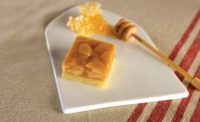2020 PREDICTIONS: SWEETENERS
Trends in Sweeteners
The ongoing trend for sweet success continues

New, natural sweeteners bring truer flavors to sweet items and better flavor balance to savory products.
PHOTO COURTESY OF: Briess Malt & Ingredients Co. (www.briess.com)
A lot has happened in the world of sweeteners in the past year. While most of the developments have been driven by the changes in labeling for added sugars, breakthroughs in ingredient technology have brought to market a number of new sweetener systems and custom and proprietary blends of nutritive, caloric sweeteners with non-nutritive, high-intensity sweeteners.
Among technical advances, combinations of masking technology and refinement of forms of stevia have taken the natural, high-intensity sweetener closer than ever to the sweetness profile of sucrose, especially when used to reduce rather than eliminate calories from sugar in formulations.

Check out our December 2019 issue for more food & beverage predictions!
Beverage makers in particular have been at the forefront of applying advances in sweeteners. Small amounts of organic stevia and organic monkfruit are now commonly being incorporated into products as part of an ongoing effort to reformulate to reduce sugar.
The Root of Sweet
Syrup from the South American yacon tuber (Smallanthus sonchifolius) continues to move forward as a sweetener of interest, especially due to its beneficial effects on insulin resistance and weight management. Yacon syrup is 75% as sweet as sucrose and high in fiber and fructo-oligosaccharides (FOS). These short-chain fibers have demonstrated positive results in studies on reducing body weight, body circumference, and body mass index.
However, being high in fiber, for some consumers too much yacon can also be a source of digestive discomfort, with some studies suggesting as little as 10g yacon syrup/day as the threshold. Yacon is available in forms other than syrup, including raw powder, chips, and semi-dried raw slices. Until recently, grain-free cereals from BetterFoods, LLC had been sweetened with either caloric yacon syrup or non-nutritive monkfruit since the company was founded in 2016.
According to BetterFoods owner Tobias Patella, the company chose yacon syrup as its signature nutritive sweetener for its Superfood Granola, a mix that contains almonds, cashews, hazelnuts, pumpkin seeds, sunflower seeds, and organic coconut oil. Patella points to the formulation’s desirable syrupy flavor as well as its functionality in processing, and also singles out yacon’s glycemic and weight management benefits.
Recently, the company decided to reformulate its granola lines with allulose. The move was a success: Patella found that an “overwhelming majority” of the company’s customers preferred the taste of allulose, a form of sugar that naturally occurs in small amounts in such foods as figs, jackfruit, caramel, wheat, maple syrup, and raisins.
“Allulose did the trick,” exclaims Patella. He notes that the natural ingredient provides volume like sucrose, qualifies for a keto-friendly claim, and does not have to be listed on a label as contributing calories from sugar since it is not effectively metabolized by the digestive system.
New Alpha Dog
Many companies were chomping at the bit to get out of the gate when the FDA released draft guidance in April 2019 exempting allulose from designation as part of total sugar and added sugar on the Nutrition Facts Panel. The key to this rare sugar’s future success comes from its versatility in applications from baked goods, candy, and frozen confections to dairy and beverages.
Sweetness Pro
Up until the early 2000s, protein-derived sweeteners such as thaumatin (1,600-3,000 times as sweet as sucrose) were pursued as an answer to artificial, high-intensity sweeteners. However, formulators found that such sweet proteins had strong, lingering aftertastes and often were unstable; they broke down in high-temperature applications or in the presence of other ingredients. When stevia and monkfruit (both about 200-300 times as sweet as sucrose) hit the market, interest in protein sweeteners seemed to wane. However, last year an Israeli company developed a fermentation process to produce a supersweet, high-intensity, calorie-free protein that can survive temperatures as high as those used in baking operations. If the cost of production lowers their price sufficiently, such proteins could be poised for a sweet return.
KNOW Foods, LLC has been using allulose in formulations for its grain-free bread, pancake, and muffin mixes since 2016. Magic Spoon, Inc. produces a line of grain-free, nostalgia-oriented RTE cereals with allulose. The “childhood favorite” revamps are higher in protein and lower in sugar than the branded market leaders. The company’s “sweet little secret” is a natural blend of monkfruit, stevia, and allulose.
Commercially produced allulose can come from numerous sources, including wheat, corn, and sugarcane, but the product most widely available today is derived from corn. A potential concern with allulose from corn may be the high prevalence of GMO corn. However, allulose suppliers now offer non-GMO versions produced from domestically grown corn, a boon for companies like BetterFoods, LLC that source only non-GMO corn.
Allulose is around 70% as sweet as sucrose, and its flavor profile is highly similar to fructose. It browns well in the Maillard reaction, too. This makes it an excellent sweetener for fruit-based items and baked goods. In fact, in many cases it can stand on its own, with the sweetness difference compared to sucrose practically undetectable in such formulations. Allulose also works well in beverages.
A temporary hurdle, however, is that FDA’s approval of allulose’s GRAS status was based on a daily limit of 30g. With all research showing the sweetener to be safe and tolerated at any level, that restriction is expected to be lifted in the near future.
Too Cool to Fool
Riding the coattails of allulose’s rise in popularity, erythritol is enjoying a burst of interest.
As with allulose, erythritol is 70% as sweet as sucrose and has negligible calories. However, erythritol also is well known for its “cooling effect,” and unlike allulose, it can be a source of gastrointestinal distress, although less so than other sugar alcohols, such as maltitol or sorbitol. Erythritol is favored in baking mixes and baked goods for its ability to brown like sugar.
The ZenSweet Co. blends water-extracted erythritol, inulin, and water-extracted monkfruit together for its retail line of sweeteners and grain-free baking mixes. The mixes are marketed as non-GMO, “paleo friendly,” vegan, low-carb, and gluten-free.
Michelle Francis-Winer, ZenSweet owner and CEO, notes that few consumers have expressed concern about the cooling effect from the erythritol, and that the success of the product line to date is a testament to its consumer acceptance. Erythritol was favored during the development process for its ability to brown like sugar. According to Francis-Winer, adding inulin helps round out the flavor of the sweetener blend and mitigate cooling notes.
Go With the Grain
Sweeteners produced from sprouted grains can leverage their benefits of contributing whole grain content, as well as nutritive plant protein and natural sweetness to cereals, baked goods, and other solid foods. Many grain-based sweeteners, including malt extracts and tapioca-based extracts, syrups, and solids, as well as maltodextrins are universally non-GMO. They provide sweet, nutty, grain-like notes, along with browning and humectancy, to bakery products.
Tapioca syrup brings broad application opportunities for meeting re-formulation challenges. It is a viable replacement for high fructose corn syrup (HFCS), as well as honey or brown rice syrup. This is due to its clean flavor and favorable consumer perception.
Malt sweeteners derived from wheat, tapioca, barley, oats, sorghum, and rice have long been used to add sweetness to baked items. Malt extracts have been used to successfully sweeten soy milk while mitigating undesirable volatile components. With distinctive flavors and colors, these grain-derived ingredients offer a highly nutritive source of mild sweetness, compared to most other sweeteners.
More companies are looking at malt syrups and powders and expanding use of these natural, and familiar sweeteners into other products, including beverages. Consumers seeking products with clean ingredients readily accept malt extract as natural. New sprouted whole-wheat powders, too, are finding functional use as sugar reducers while providing whole-grain labeling cachet.
Originally appeared in the December 2019 issue of Prepared Foods as Sweeter by the Year.
Looking for a reprint of this article?
From high-res PDFs to custom plaques, order your copy today!






